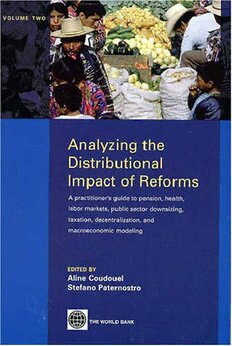
Analyzing the Distributional Impact of Reforms, Vol.2 PDF
470 Pages·2006·2.239 MB·English
Most books are stored in the elastic cloud where traffic is expensive. For this reason, we have a limit on daily download.
Preview Analyzing the Distributional Impact of Reforms, Vol.2
Description:
The analysis of the distributional impact of policy reforms on the well-being or welfare of different stakeholder groups, particularly on th e poor and vulnerable, has an important role in the elaboration and implementation of poverty reduction strategies in developing countries. In recent years this type of work has been labeled as Poverty and Social Impact Analysis (PSIA) and is increasingly implemented to promote evidence-based policy choices and foster debate on policy reform options. While information is available on the general approach, techniques, and tools for distributional analysis, each sector displays a series of specific characteristics. These have implications for the analysis of distributional impacts, including the types of impacts and transmission channels that warrant particular attention, the tools and techniques most appropriate, the data source typically utilized, and the range of political economy factors most likely to affect the reform process. This volume provides an overview of the specific issues arising in the analysis of the distributional impacts of policy and institutional reforms in selected sectors. Each chapter offers guidance on the selection of tools and techniques most adapted to the reforms under scrutiny, and offers examples of applications of these approaches. This is a companion to the first volume, which offers guidance on trade, monetary and exchange rate policy, utility provision, agricultural markets, land policy, and education. Also includes a CD-ROM containing chapters from companion volume 1, the PSIA User's Guide, Good Practice Note, E-learning course, and links to resources.
See more
The list of books you might like
Most books are stored in the elastic cloud where traffic is expensive. For this reason, we have a limit on daily download.
